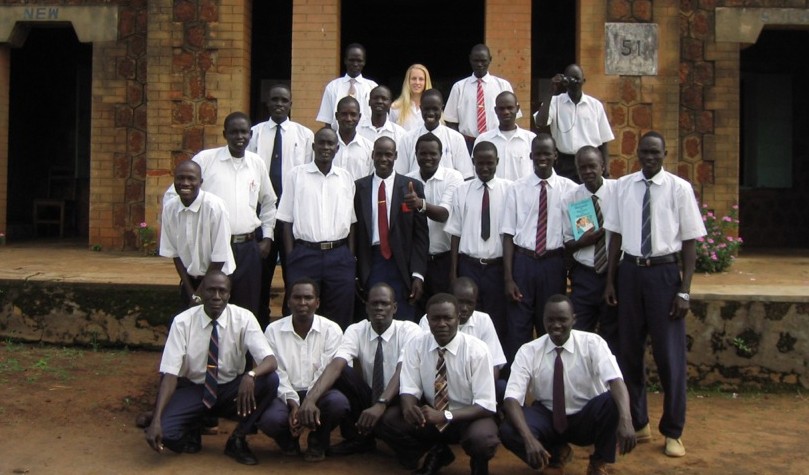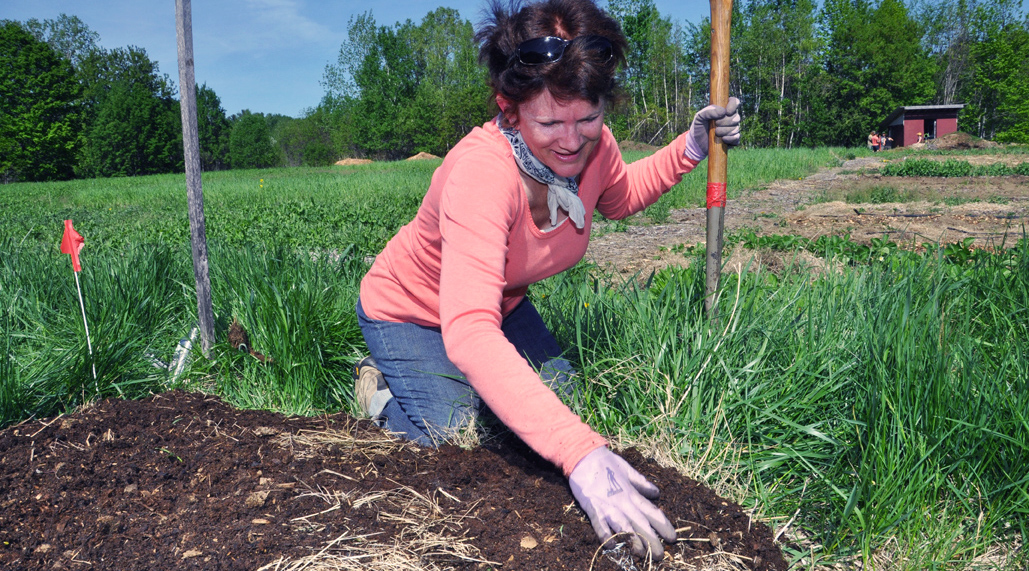By Sarah Tuff Dunn
In a way, bambini are Gibbs Rehlen’s specialty: After a tutoring stint in South Sudan, the 2001 UVM graduate in comparative religion and sociology spent one year working at Fondazione Bambini in Emergenza, an Italian foundation for HIV-affected children. Later came communications and marketing work in Rome and Italy and several years at the Washington, DC–based nonprofit Pact.
But when it came time for her own bambina, born just two weeks before she sat down for this interview, Rehlen admitted a bit of befuddlement. “I have a lot to learn,” says Rehlen, whose most recent post has been at ecoAmerica, overseeing project management and climate-change awareness for the higher ed sector.
![]() Fortunately, the multitasking skills that have piloted her around the world are also grounding her as a new mom. “You always have to be thinking of a million different details and balance everything in the best interest of your child,” says Rehlen. “You have to plan ahead and be an active troubleshooter so you can identify what’s best for your family.”
Fortunately, the multitasking skills that have piloted her around the world are also grounding her as a new mom. “You always have to be thinking of a million different details and balance everything in the best interest of your child,” says Rehlen. “You have to plan ahead and be an active troubleshooter so you can identify what’s best for your family.”
Here, Rehlen helps identify what’s best for launching careers in global service, and the benefits of working and living abroad.
Tell us about moving to Italy after graduation and about South Sudan.
I moved to Rome, Italy, with no clear plan. When I arrived, I started tutoring kids of affluent families in English and math and holding one-on-one English language lessons with adults. It was a great way to hold my own hours and spend the rest of the time learning the language, exploring the city, and thinking about what I would like to make of my life. I stayed just a few months in South Sudan, but it was scary and tough. That first experience opened my mind to helping others and engaging in the not-for-profit sector.
And then you went from Fondazione Bambini in Emergenza to law firms in Rome and Milan. What allowed you to take that career leap?
I was still committed in my heart to the not-for-profit sector but decided I needed a master’s degree to have any real hope of being competitive in the sector. In the meantime, I found my first corporate, for-profit job working on marketing and communications for an Italian law firm. It was a great experience working in a large corporate environment. It was also tough as an American working in such a hierarchical environment with Italian as the working language.
What lessons did you learn from Italian culture that might be applied to career advice?
(1) Innovation and creativity. Italians love their individuality. They have a way of looking at something in many different ways, developing products and services that may appear only slightly different but deliver more impactful results. As an example, the same cake can be made in many different ways depending on the region in Italy you live. Don’t try to change that! In the United States, we are the opposite: Starbucks and McDonald’s are proud to deliver the very same product all over the states.
(2) Persistence. There is always a way. Italy is a bureaucratic place, and you have to be prepared to try and try again in any shape or form to get results. Flexibility and the ability to survive in the most complicated surroundings are part of the Italian DNA.
What is the most useful phrase you know in Italian that can be applied to employment?
Non mollare mai. “Don’t ever give up.” If you want to work for a particular company, create your own enterprise, or work abroad like I did, go for it. Life is short and rich with opportunity. With determination, you can reach audacious goals.
How did your experience at UVM help you prepare for your career?
I was part of the UVM Horse Barn, which is a student-run cooperative. Being part of the Horse Barn meant managing the barn as part of a larger group, working as part of a team, and doing weekly barn chores. The UVM Horse Barn was another way in which I learned discipline and consistency, which has helped prepare me for a career in project management.
How can those interested in corporate social responsibility get a foot in the door?
Look for ways in which you can improve a company’s bottom line or their reputation and go to them with an idea. When I approached an Italian law firm in 2007, it was with an idea to create value for their firm by spearheading a pro bono office to help differentiate themselves from their national counterparts, as Italian law firms didn’t do pro bono work at that time. If you show how you can help a business or firm stand out, you’ll be able to differentiate yourself successfully from the competition. And don’t just talk with one prospective employer! I met with nearly five firms before meeting with someone who got it. Again, persistence pays off!
What lessons have you learned from ecoAmerica?
In addition to leading a project management initiative to ensure we are delivering on our promise to one another internally, and to our partners and grantees externally, I also manage ecoAmerica’s higher education program to educate leaders and students about climate change. Whether it’s an internal or external audience, I’ve learned that you always have to make your case as to why your audience should listen to you. Internally, I’ve had to introduce and reiterate the importance of project management in the workplace and convince my colleagues to adopt important behavior change and use new systems so that we can work more effectively.
How does living in DC compare to living abroad?
Living abroad helped me grow in many different ways as a person. It provided me with the opportunity to meet new people, learn a language well, become more independent, and create a life for myself, which I wouldn’t have had otherwise if I had stayed put. I strongly recommend that young people learn a foreign language and go live abroad for a while. Now, living in a dynamic, cosmopolitan world capital affords unique social and career opportunities you find only here. Coming to Washington was an important move to familiar territory where I can follow my interests in nonprofit management, sustainability, and making a difference.
Read more UVM Alumni Advice interviews at learn.uvm.edu.
-Sarah Tuff Dunn is a freelance writer from Shelburne.




